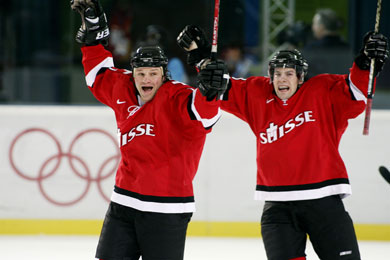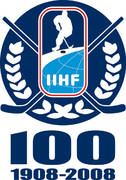Story #87
TURIN, Italy – February 18, 2006
As in the two previous Olympics featuring NHL players — 1998 in Nagano and 2002 in Salt Lake City — Canada was the pre-tournament favourite to win gold at the 2006 Olympics in Turin. For starters, it had won four years earlier. Second, the entire management team that had put together that gold medal team was back, led by GM Wayne Gretzky and head coach Pat Quinn. Third, as always, Canada had the deepest pool of talent from which to draw. And, for good measure, Canada had a schedule that suited its needs, one which gave it weaker opponents to start, thereby allowing the team to work out the kinks and develop chemistry during games which were not vital to gold-medal hopes.
And that's how things began. The team started with an easy and impressive 7-1 win against the host Italians, and it followed with an equally easy 5-1 win against Germany. This set up a game against Switzerland, a team that could not possibly have hoped or expected to compete with, let alone defeat, the mighty Canadians. A team that featured Martin Brodeur in goal and players such as Joe Sakic, Rick Nash, Jarome Iginla, and Martin St. Louis surely could not be bettered by one that featured, with all due respect, Severin Blindenbacher, Martin Pluss, and Romano Lemm. But the Swiss were coming off an historic 3-2 win against the Czechs two days earlier, giving them more confidence than they might normally have had. Sometimes the unexpected happens, and on this day the Swiss got some breaks and some timely goals from — believe it or not — a Canadian.
Paul DiPietro, a fringe NHLer from the 20th century, had moved to Switzerland in 1999 to continue his career and had done quite nicely. In fact, he enjoyed the hockey and country so much he made this his permanent residence and became a Swiss national. He had played several times for the Swiss internationally but never against his homeland at such an important event. Yet, as fate would have it, he played the game of his life.
DiPietro scored late in the first period to give his adopted country a 1-0 lead, and amazingly Canada could do no right in this game. Rick Nash thought he tied the game in the second period, but goalie Martin Gerber made a sensational glove save right at the goal line. Photographs later revealed the "save" had been made inside the net and Nash's shot should have counted as a goal, but it didn't and DiPietro scored on a five-on-three to make it 2-0. Gerber stoned the Canadians the rest of the way, stopping all 49 shots he faced to give his country its biggest win ever and its first win against Canada since the two nations started playing back in 1924 (a 33-0 win by Canada).
The Swiss went on to the quarter-finals, but the Canadians never recovered from that devastating defeat. They lost the next game to Finland, 2-0, beat the Czechs 3-2 in a mostly meaningless game, and lost to the Russians in their quarter-finals game. They finished seventh, the worst showing in that country's hockey history. And in sixth place? Paul DiPietro and his adopted homeland, Switzerland!
As part of the IIHF's 100th anniversary celebrations, www.IIHF.com is featuring the 100 top international hockey stories from the past century (1908-2008). Starting now and continuing through the 2008 IIHF World Championships in Canada, we will bring you approximately three stories a week counting down from Number 100 to Number 11.
The Final Top 10 Countdown will be one of the highlights of the IIHF's Centennial Gala Evening in Quebec City on May 17, the day prior to the Gold Medal Game of the 2008 World Championship.
These are the criteria for inclusion on this list: First, the story has to have had a considerable influence on international hockey. Second, it has to have had either a major immediate impact or a long-lasting significance on the game. Third, although it doesn't necessarily have to be about top players, the story does have to pertain to the highest level of play, notably Olympics, World Championships, and the like. The story can be about a single moment — a goal, a great save, a referee's call — or about an historic event of longer duration — a game, series, tournament, or rule change.
|










